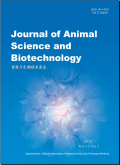首页|期刊导航|Journal of Animal Science and Biotechnology|Multi-omics analysis reveals the molecular regulatory network underlying the prevention of Lactiplantibacillus plantarum against LPS-induced salpingitis in laying hens
Multi-omics analysis reveals the molecular regulatory network underlying the prevention of Lactiplantibacillus plantarum against LPS-induced salpingitis in laying hens
Dan Song Aike Li Bingxu Chen Jia Feng Tao Duan Junlin Cheng Lixian Chen Weiwei Wang Yuna Min
Journal of Animal Science and Biotechnology2024,Vol.15Issue(1):P.427-441,15.
Journal of Animal Science and Biotechnology2024,Vol.15Issue(1):P.427-441,15.DOI:10.1186/s40104-023-00937-x
Multi-omics analysis reveals the molecular regulatory network underlying the prevention of Lactiplantibacillus plantarum against LPS-induced salpingitis in laying hens
摘要
关键词
Laying hen/Metabolome/Microbiome/Microencapsulated Lactiplantibacillus plantarum/Salpingitis/Transcriptome分类
农业科技引用本文复制引用
Dan Song,Aike Li,Bingxu Chen,Jia Feng,Tao Duan,Junlin Cheng,Lixian Chen,Weiwei Wang,Yuna Min..Multi-omics analysis reveals the molecular regulatory network underlying the prevention of Lactiplantibacillus plantarum against LPS-induced salpingitis in laying hens[J].Journal of Animal Science and Biotechnology,2024,15(1):P.427-441,15.基金项目
funded by the National Natural Sciences Foundation of China (No.32002192) (No.32002192)
Research Fund for National Non-profit Research Institution (grant number JY2016) (grant number JY2016)
China Agriculture Research System of MOF and MARA (CARS-40-S20)。 (CARS-40-S20)

